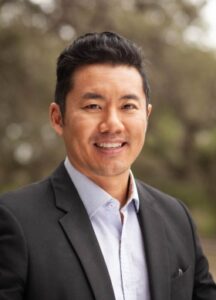
Jack Tsai, PhD. Research Director of the VA’s National Center on Homelessness Among Veterans (NCHAV)
SAN ANTONIO — Few people understand the complexity of providing care to homeless veterans and those at risk for homelessness as well as Jack Tsai, PhD.
The research director for VA’s National Center on Homelessness Among Veterans (NCHAV) since 2019, Tsai has published more than 200 peer-reviewed articles examining trauma, mental illness, health disparities and a wealth of other topics related to homelessness. Now he helps support and guides VA researchers across the country, in the hopes of providing direct improvements to some of the most vulnerable veterans.
Tsai began his VA career as a psychologist at West Haven, CT, VAMC 15 years ago, where he provided direct clinical care while also serving on the faculty of Yale University in New Haven. More recently, he became the campus dean and professor of public health at the University of Texas Health in San Antonio.
“I kind of had a balance between clinical duties and research roles, but over time I took over more research administration roles,” Tsai said. “There are a lot of rewarding things providing direct care to veterans, but I found myself really being interested in the large impacts of research.”
Originally focused on severe mental illnesses, particularly schizophrenia, he gravitated naturally to the issue of homelessness.
“Mental health and homelessness are very interrelated,” he explained. “If you have mental illness, that often comes with cognitive deficits. … You can have problems securing housing and maintaining it, getting rent, keeping an apartment tidy.”
The impact can also go the other way, with housing difficulties compounding a patient’s mental health issues. The stress and uncertainty can be psychologically devastating, and not having a stable place to live can be daunting for those patients who have strict regimens of psychiatric medications. What happens if you don’t have a safe place to store those medications or don’t have a reliable way to hold to a medication schedule?
More importantly, what can VA do to help?
“In terms of research, I was always a little skeptical of are we doing the right thing?” Tsai said. “Are these services and interventions—are they really effective? Is what VA and their providers doing—is that what’s best?”
Now in his role at NCHAV, he can help answer those questions while shifting VA’s research portfolio to focus on the most current pressing issues.
“It’s a moving target,” Tsai said. “Every year, we send a survey out to stakeholders, both federal and non-federal partners, to get a list of priorities from them. Then we kind of develop and collate, and we come up with a list of priorities that we focus on.”
One of those priorities this year is the rise in unsheltered homelessness and understanding the causes and best ways to prevent it. Another priority is discovering ways that VA’s various homeless programs and support staff can collaborate as a single team, rather than working separately and overlapping their efforts.
VA has helped reduce veteran homelessness 52% since 2010, and Tsai would like to think NCHAV has had a hand in that.
“Some of VA’s current homeless programs were started as demonstration projects by the center,” he explained.
For example, VA’s move toward a housing first philosophy—helping veterans obtain permanent supportive housing then adding on resources from there—was bolstered by evidence gathered by NCHAV. Another example are the legal clinics embedded in some VA medical centers, which help veterans with civil legal issues, including evictions and landlord disputes.
“We did one of the first studies on that,” Tsai declared.
He’s also seeing growing interest from medical providers on the clinical impacts of homelessness. It’s long been accepted that being unhoused has a negative impact on morbidity and mortality and can accelerate the physical deterioration seen with natural aging. But the question remains as to how a clinician can measure that impact on an individual patient.
“We’re trying to understand how to best measure clinical acuity and the clinical need among veterans. That’s important, because homeless veterans are very diverse in their needs. Knowing how severe their homelessness is and what their clinical needs are can help guide their case management,” Tsai explained.
While NCHAV supports a housing-first philosophy, Tsai understands that obtaining a place to live is not a panacea for all of a homeless veteran’s ills.
“We’ve done a study of supportive housing,” Tsai said. “It improves housing outcomes, but it didn’t move the needle on how engaged people felt in their communities or in social support.”
Housed in neighborhoods with which they might not be familiar, veterans can feel cut off from the people around them.
“We’ve heard from clinical anecdotes that lots of veterans feel isolated,” he explained. “There’s loneliness, even after they’re permanently housed.”
With that in mind, one of the NCHAV is helping support research not just into medical care and housing, but in how to best help veterans obtain employment and improve social engagement.
“We set a high bar for ourselves to help veterans not just get housed but to really be productive,” Tsai said

